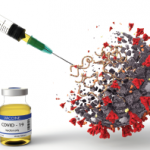ATLANTA—Rheumatologists are often asked about the safety and efficacy of various immunizations in adults with rheumatic diseases, but many have questions about which vaccines are safe to use in this population. Clifton Bingham III, MD, director of the Johns Hopkins Arthritis Center and associate professor of medicine at Johns Hopkins University in Baltimore, addressed these concerns during a presentation titled “Immunizations and Rheumatic Diseases: An Update” at the 2010 ACR/ARHP Annual Scientific Meeting here in November.
Dr. Bingham remarked that many rheumatologists may hesitate to vaccinate patients with inflammatory and autoimmune disease for fear of triggering flares of disease or because of possible contraindications with the medications patients take. However, there are some vaccinations that are appropriate for this group.
“We know that patients with diseases such as rheumatoid arthritis [RA] and lupus have an increased risk of usual infections as well as atypical infections. We also understand that corticosteroids and immunomodulators may increase this risk and that outcomes can be more severe in this population. Immunizations can help decrease these risks,” said Dr. Bingham in the session, “Immunizations and Rheumatic Diseases: An Update.” [Editor’s note: This session was recorded and is available via ACR SessionSelect at www.rheumatology.org.]
Dr. Bingham said that studies in patients with autoimmune disease have shown a significant “underutilization and underappreciation” of immunizations.
A survey conducted by the ACR in April 2008 found a knowledge gap related to rheumatologists’ understanding of vaccines, Dr. Bingham said. For example, only 40% of those surveyed realized that yellow fever was a live vaccine; only 39% identified human papillomavirius (HPV) as an inactive vaccine.
In addition to any vaccine misunderstandings or a fear that they will worsen diseases, Dr. Bingham believes that a lack of familiarity with vaccine recommendations and a lack of communication between rheumatologists and primary care physicians also contribute to underutilization of vaccines in patients with autoimmune disease.
Although some reports in the literature have addressed a possible association between vaccinations and worsening disease, the incident rate is quite low, Dr. Bingham said. “The risk–benefit assessment shows the benefit of immunization,” he said.
Dr. Bingham believes that a lack of familiarity with vaccine recommendations and a lack of communication between rheumatologists and primary care physicians contribute to underutilization of vaccines in patients with autoimmune disease.
Which Vaccinations To Recommend
Dr. Bingham listed these vaccinations as safe for patients with autoimmune disease: diphtheria, acellular pertussis, hepatitis A/B, seasonal flu A/B (injected), injected H1N1, HPV, smallpox, inactivated polio, pneumococcal conjugate (PCV7 in children), and meningococcal conjugate.



